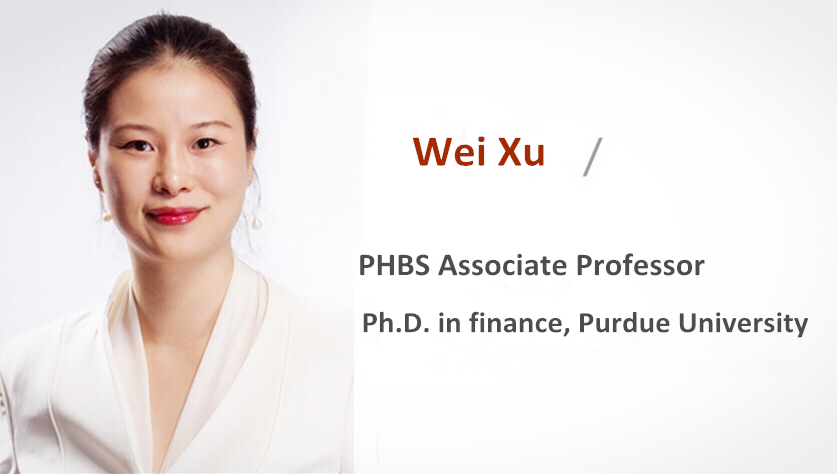Hedge funds have grown rapidly in recent decades. According to the 2017 “Preqin Global Hedge Fund Report,” global hedge funds are estimated to control more than US $3.211 trillion, the highest level in the past year-and-a-half. As hedge funds have a significant market influence and are a benchmark for the investment market, investors often discuss the dynamics and fluctuations of hedge funds, such as hedge funds increasing their holdings of Alibaba Group stocks, buying gold ETFs (a marketable security that tracks an index, a commodity, bonds, or a basket of assets like an index fund), and trying to long US stocks. So how does a hedge fund affect the capital market or influence the price of securities?
The international academic journal,
Management Science, has recently published “Arbitrage Involvement and Security Prices,” co-authored by Peking University HSBC Business School (PHBS) Associate Professor Xu Wei; Baixiao Liu, assistant professor at Florida State University; and Byoung-Hyoun Hwang, assistant professor at Cornell University. They conducted a two-stage analysis to investigate how the emergency of shortable securities affects hedge funds’ purchase on underpriced stocks, and how hedge funds’ increased involvement in these stocks helps correct underpricing.
Established in 1954,
Management Science is a peer-reviewed academic journal that covers research on all aspects of management related to strategy, entrepreneurship, innovation, information technology, and organizations, as well as all functional areas of business, such as accounting, finance, marketing, and operations. According to
Journal Citation Reports, the journal had an impact factor of 2.822 in 2016 (4.131 for the past five years), a measure reflecting the yearly average number of citations of recently published articles. Journals with higher impact factors are often deemed to be more important than those with lower ones.
Xu and her co-authors focus their research on arbitrage involved in hedge fund investment and its influence on securities prices. Since in Hong Kong only stocks added to a special list can be shorted, their first-stage analysis uses hedge fund holdings data and provides evidence that the emergence of shortable securities, indeed, causes hedge funds to more aggressively buy seemingly underpriced stocks. Their second-stage analysis presents evidence that hedge funds’ increased involvement in these stocks helps correct underpricing and moves prices in the direction of fundamentals.
They take publicly traded banks such as HSBC Holdings (HSBC) and Chong Hing Bank (CHB) as the empirical evidence. HSBC was added to the short-sale list in 1994 and became the first publicly traded bank whose shares can be shorted, while CHB had a substantially lower MB (market-to-book ratio) than its industry peers and appeared undervalued. The paper proved that the addition of HSBC to the short-sale list substantially improved the short-long investors’ ability to hedge industry risk and encouraged hedge funds to more aggressively buy shares of CHB and led to a permanent rise in CHB’s stock price. However, in industries which already have many shortable securities, the impact caused by the addition of one more security to the short-sale list should be not as strong as that of this scenario.
To encourage such arbitrage involvement, the paper points to the need for a well-functioning short-selling market: the presence of a deep and liquid short-selling market, in which hedge funds can more aggressively trade on underpricing, eliminates anomalous price differences and positively contributes to the security price discovery process. Their study adds to the literature on what determines hedge fund activity and how hedge fund involvement affects financial markets. How short-selling affects the capital market has been a long-standing concern of the financial community, and the authors’ work also contributes to the literature on short selling by proving that imposing short-sale constraints can actually cause stock prices to go down or remain at depressed levels.
With a Ph.D. in finance from Purdue University, Professor Wei Xu joined PHBS as an assistant professor in 2010 and was promoted to associate professor last year. Prior to joining PHBS, she worked at the Law and Economics Consulting Group, the largest legal consulting firm in the United States, and then worked for Mathehma Capital Management as a quantitative hedge fund research director. Xu’s research focuses on asset pricing, short-selling, corporate finance and investment. Her papers have been published in internationally renowned academic journals such as
Management Science,
Journal of Banking & Finance,
Journal of Empirical Finance, and
Financial Analysts Journal.
By Annie Jin
Edited by Priscilla Young















